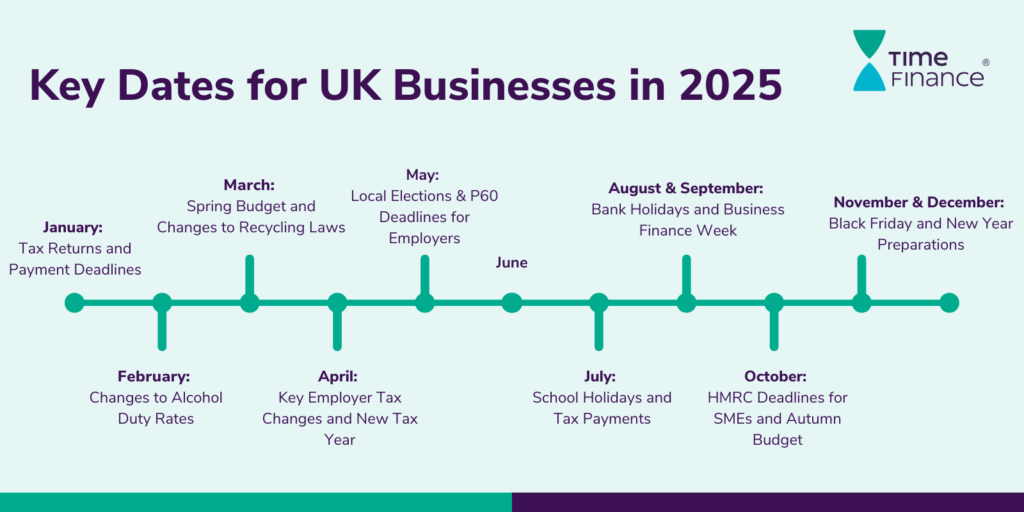
At Time Finance, we know how demanding running a successful business can be, it requires careful planning, preparation, and staying ahead of what’s coming next. That’s why we’ve compiled a list of key dates for UK businesses in 2025. From tax filing and payment deadlines to bank holidays, new tax year measures, and essential obligations for limited companies, this guide is designed to help you stay organised and ahead of the curve.
January: Tax Returns and Payment Deadlines
The first important date business owners should be aware of is midnight on 31st January 2025. This is when all online filings, tax payments for the previous year, and the first payment on account for the 24-25 tax year are due.
31st January - Deadline for filing an online Self Assessment tax return: Submit your online Self Assessment tax return for the 2023-24 tax year (6th April 2023 to 5th April 2024) by midnight on 31st January 2025. Missing this deadline results in an automatic £100 penalty, with further charges if delays continue beyond 3, 6, and 12 months.
31st January - Pay your 2023/24 Self Assessment bill: Settle any taxes owed for the 2023-24 tax year, including Income Tax, National Insurance Contributions, Capital Gains Tax and other applicable charges. This must be done in full by midnight on 31st January 2025.
31st January - First payment on account for the 2024/25 tax year bill: You’ll need to make your first payment on account for your 2024-25 tax bill by 31st January 2025.
Payments on account are advance payments that you make twice a year towards the following year’s tax bill. They help spread the cost of your tax by making payments in 2 instalments. Each payment is half of the tax you owed last year.
February: Changes to Alcohol Duty Rates
1st February - Changes to Alcohol Duty rates:
- A 1.7% cut (in cash terms) to Alcohol Duty rates on qualifying draught products, including qualifying beer and cider, wine, other fermented products, and spirits.
- An end to the current temporary wine easement.
- An increase in the cash discount provided to small producers for non-draught products. (Small Producer Relief)
These changes mean that the price of still and sparkling wine will increase by an average of 15p per bottle, while the cost of an average-strength pint will be 1p cheaper.
March: Spring Statement and Changes to Recycling Laws
March 26th - Spring Statement: Remember that the announcement of the Spring Statement will take place on March 26th, 2025. The Chancellor will provide an update on the progress that the United Kingdom has made since the Autumn Budget, and some of the information that is presented may have an impact on your business.
March 31st - New commercial recycling laws: As part of the Environment Act 2021, new recycling legislation is scheduled to go ahead from March 31st, 2025. To comply with the law, all businesses located in England that have ten or more full-time employees will be required to separate their food waste from their dry recyclables and general waste as of this date.
In addition to separating materials, they must arrange for an approved waste management provider to collect their core recyclables (excluding garden waste). This includes glass, metal, plastic, paper and card, and food waste. Please take note that this rule does not apply to companies that are located in the countries of Scotland, Wales, or Northern Ireland.
April: Key Employer Tax Changes and New Tax Year
5th April - End of the 24/25 tax year: The 24/25 tax year ends on 5th April 2025. If you file through Self Assessment or prepare annual accounts in line with the financial year, 5th April marks the last day of your 2024-25 accounting period.
This date is also the deadline for registering for HMRC’s payrolling benefits and expenses online service. If you’re an employer, you can tax employees’ benefits and expenses through your payroll and then report to HMRC online rather than using form P11D.
6th April - Start of 25/26 tax year: The 2025-26 tax year begins on 6th April 2025 and runs until 5th April 2026.
6th April - Changes to employer National Insurance and the Employment Allowance: As announced at the 2024 Autumn Budget, the rate of employer (secondary) Class 1 National Insurance contributions will increase from 13.8% to 15% from 6th April 2025.
Additionally, the Secondary Threshold (the point at which employers start paying NICs on employees’ wages) will decrease from £9,100 per year to £5,000 per year. This measure will be in effect from 6 April 2025 until 5 April 2028.
However, the Employment Allowance will increase from £5,000 to £10,500 per year, and the £100,000 eligibility threshold will be removed. These changes mean that the Employment Allowance will extend to more employers and provide a greater reduction in their NIC liability.
6th April - Statutory pay increases:
New rates of statutory pay will take effect from 6th April 2025. These changes are as follows:
- Statutory Sick Pay (SSP) will increase from £116.75 to £118.75 per week.
- Statutory Maternity, Paternity, Adoption, Shared Parental, and Parental Bereavement Pay will increase from £184.03 to £187.18 per week.
- Maternity Allowance will also rise to £187.18 per week.
- The National Living Wage (NLW), the minimum employers must pay staff aged over 21, will increase from £11.44 per hour to £12.21 per hour. Also, the National Minimum Wage (NMW) for staff aged 18-20 will increase from £8.60 to £10 per hour.
- Finally, the apprentice rate will increase by 18%, from £6.40 to £7.55 per hour.
18th April - Good Friday Bank Holiday
21st April - Easter Monday Bank Holiday
May: Local Elections & P60 Deadlines for Employers
May 1st - Local elections: There will be local elections, which are something to keep an eye out for during the month of May. The outcome of this event, which applies to all county councils in England, may have an effect on your small business.
5th May – Early May bank holiday
26th May – Spring bank holiday
31st May - P60 deadline: The deadline for issuing P60s to all current employees (if applicable) for the 2024/25 tax year is 31st May 2025. A P60 provides a summary of the total tax an employee has paid on their earnings during the tax year. If you’re a limited company director and receive a salary, you’ll also need to issue yourself a P60 by this date.
June: No significant announcements or deadlines impacting businesses are in June
July: School Holidays and Tax Payments
End of July - School Summer Holidays begins: Plan ahead for the School Summer Holidays, starting in late July, to manage staff leave and maintain smooth business operations.
31st July - Second payment on account is due for the 2024-25 tax year bill: This is the deadline for the second payments on accounts for the 24/25 tax year bill.
August & September: Bank Holidays and Business Finance Week
25th August – Summer bank holiday
Date TBC – British Business Bank’s Business Finance Week:
A week of free online and in-person workshops and events to help small business owners understand what finance is available to meet their needs. Keep an eye on their website for details as dates vary; last year’s events took place the last week of September, while other years they have been later.
October: HMRC Deadlines for SMEs and Autumn Budget
5th October - Deadline for Self Assessment registration:
If you’ve started a business in the 2024/25 tax year (between 6 April 2024 and 5 April 2025) and you’re not yet registered for Self Assessment, you have until 5 October to submit your application to HMRC.
5th October - Deadline for notifying HMRC of new partnerships:
If you started a partnership or became a partner in the 2024-25 tax year, you must notify HMRC by today to avoid penalties.
End of October - Autumn Budget:
It has not been determined when the Autumn Budget announcement will take place in 2025. However, it typically occurs during the second half of the October. In light of the fact that the government is going to announce plans that may have an impact on your small business, it is important that you pay attention to this announcement.
November and December: Black Friday and New Year Preparations
28th November – Black Friday: Black Friday is considered the busiest online shopping day of the year, followed by Cyber Monday on 1st December.
These quieter festive periods offer a valuable opportunity to get ahead and prepare for upcoming tasks and deadlines. For example, you can use the time in December to begin organising your records, gathering necessary documents, and reviewing your finances in preparation for the online Self Assessment deadline in January 2026. By starting early, you can avoid the last-minute rush, reduce stress, and ensure everything is submitted accurately and on time, giving you peace of mind as you enter the new year.
Summary
It will be another busy year for small businesses in 2025, with some of the most significant changes coming into force in April affecting employers. Our guide to key dates for UK businesses in 2025 can help you stay organised and prepared for these changes. To make these changes more manageable and control your cash flow during this time, take a look at our flexible finance solutions, including Invoice Finance, Asset Finance, Secured Loans, and Asset Based Lending. To learn more about how our finance solutions can help businesses grow, get in touch with our team today.
